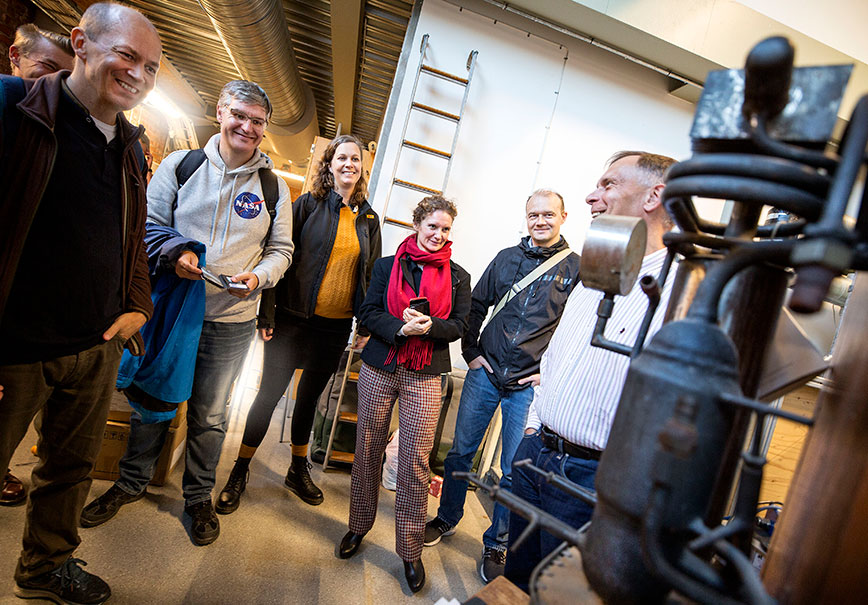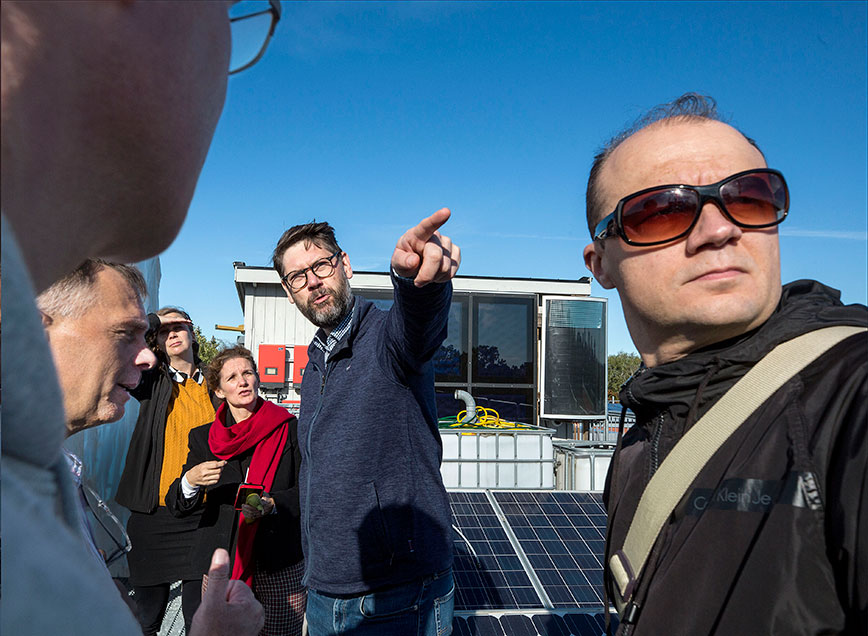KTH Energy Platform made a fascinating visit to the ITM labs
School Visits

At the end of September, 2021, KTH Energy Platform made a repeat visit to the School of Industrial Engineering and Management (ITM) to take a closer look at lab activities there in particular. The previous visit was made digitally due to the pandemic, but still provided valuable insights into a number of activities.
You can read more about the previous ITM visit here .
The latest visit was a fascinating tour of ITM’s lab facilities led by professor and head of department Björn Laumert and lab managers Peter Hill and Jens Fridh. Research is being done here on everything from heat pumps to solar energy and aviation development.
Lina Bertling Tjernberg, KTH Energy Platform director, opened the meeting together with deputy director Christophe Duwig. Also from the Energy Platform were representatives from ABE Pernilla Hagbert and SCI Ilja Sytjugov, as well as platform communicator Helena Mayer and Pierre Bodin at Research Office Support with special responsibility for the energy sector.
Up-scale climate chambers
Peter Hill guided the group through four recently rebuilt climate chambers capable of varying temperatures between about plus 45 and minus 35 degrees Celsius. With the help of movable walls, a large chamber can be created here with enough space for a family car. The facility was rebuilt in part to make it possible to use more sustainable technologies and more environmentally friendly refrigerants than in the past.
Hill stressed that the chambers are also available to researchers from other schools at KTH. He also welcomed more collaborations within KTH so that all the advanced equipment at ITM could benefit more people.
The energy-related research conducted by ITM ranges from applied thermodynamics to energy systems and power and heat technology.
Large-scale roof-top research
Next stop was the ITM roof, which is used for larger-scale research projects. These include solar-powered heat pumps, energy storage systems, and more advanced heat pumps for high temperatures.
A facade cladding developed to capture solar energy was also demonstrated, as was research to cool rocket nozzles that will be used for the next generation of Ariane rockets to launch satellites.

Back in the lab, the group was met by a 100-year-old prototype made by Baltzar von Platen and Carl Munter’s first refrigerator. The breakthrough was developed as a joint degree project at KTH and laid the foundations for Electrolux. The prototype was developed at ITM and stunned the world as the first refrigerator without moving parts.
Remote students from all over the world
Jens Fridh then demonstrated the equipment used for a lifelong learning course which is provided in partnership with Siemens. The programme provides students from all over the world the opportunity to control and monitor their lab experiments over the internet. The equipment became particularly useful during the pandemic, but the technology has been used at various times in the past ten years for remote study and in normal course activities.
Remote students are active in the industry and work with designing everything from aircraft engines to gas turbines. ITM’s aeromechanics researchers are known internationally and make valuable contributions to the global industry.
Björn Laumert then demonstrated high-temperature equipment where air is heated to about 1,000 degrees Celsius and then channeled into a “stone bed” for heat storage. This can be used in industry to store heat and later convert it into electricity.
The visit then went on to the ITM Solar Facility Lab, which simulates the high energies found in solar power plants in desert areas. Receiver units and new materials are tested at the facility, for example ceramic hybrid materials.
During the visit, test turbines used for research on turbulence and air flows, as well as equipment for studying turbulence around aircraft wings, and cooling of aircraft engines were also shown. A lot of applied research is conducted here together with partners such as Siemens and GKN Aerospace. The research is also supported by the EU and Vinnova, among others.
The research centres on aviation development related to the aviation industry’s major transition to new aviation fuels, such as hydrogen and biofuels, as well as electric aviation.
Upcoming visits from KTH Energy Platform will take place on 25 October, when the School of Engineering Sciences will visit KTH’s new building on Albano Campus.
Text: Magnus Trogen Phalén
